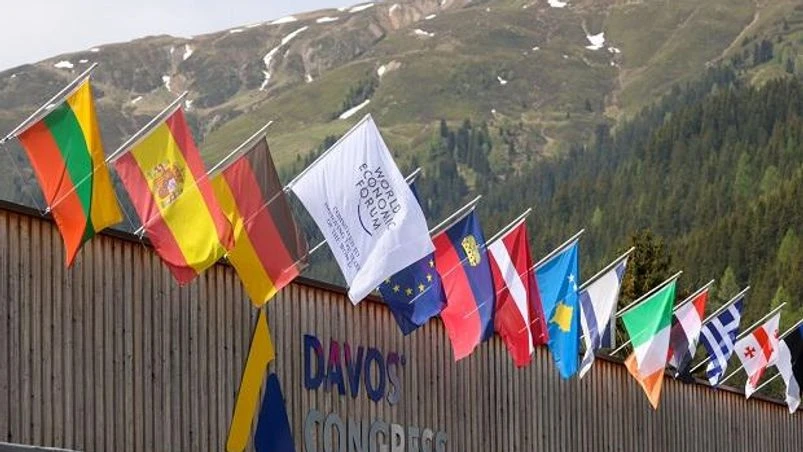 What are key takeaways from WEF meet? What made India stood out this year?
What are key takeaways from WEF meet? What made India stood out this year?
The World Economic Forum ended with a call for unity and a win-win world. But is the world order shaping up like that? Here are the highlights of the event in which India emerged as a bright spot.
Bhaswar Kumar New Delhi
)
“Attendance from China, Japan and Korea was sparse this year and of course we heard nothing from Russia or much from Ukraine attendees” – This is what Gautam Adani, Chairman of Adani Group, wrote about his experience at Davos 2022.
Even as the world’s rich and powerful descended on Davos, the sentiment at World Economic Forum’s annual meeting wasn’t the same as before. Consider the conspicuous absence of many titans of finance.
According to Bloomberg, the chiefs of JPMorgan Chase and Goldman Sachs were not in attendance. Neither was BlackRock Inc’s Larry Fink or Blackstone’s Steve Schwarzman.
Meanwhile, nearly 100 participants and dozens of political leaders from India attended the World Economic Forum, and presented the country’s position on the energy situation, food security and health equity at Davos.
And, India’s enthusiasm was well-founded. Here’s what Business Standard reported from Davos.
India found itself at the centre of many dialogues on emerging issues, ranging from climate change to crypto technologies.
European business leaders were eagerly scouting options for diversifying trade and investments. India appeared to be the best option for most of them, thanks to its political stability and reformist policies.
Many global investors endorsed India’s rising economic relevance. For example, Saint Gobain Global CEO Benoit Bazin said that the company plans to invest over Rs 5,500 crore in the next four years in India. Bazin was bullish about the 45-billion-Euro company’s growth story in India.
Also Read
David Rubenstein, co-founder of the private equity Carlyle Group, told reporters in Davos that “India has been more attractive [to buy assets] of late than China.” Clearly, India benefitted from the absence of China and concerns over its heavy-handed ‘zero Covid’ strategy.
Speaking from Davos, Pranjal Sharma of Business Standard says India is presenting itself as a stable, dynamic and growing emerging market at Davos. This is in contrast to the troubles in Europe and the US due to the ongoing Ukraine war. The idea is to attract investors worried by the uncertainty in markets and rising inflation, he says. State govts and the Centre aligned in their goals of presenting Brand India aggressively at Davos, Sharma says.
Ministers from several state governments, including those of Tamil Nadu, Maharashtra, Telangana, Andhra Pradesh and Madhya Pradesh, were also in Davos to attract global investors.
Andhra Pradesh reportedly signed renewables investment pacts cumulatively worth about 1600-crore rupees with three companies. The investment commitments were made with India’s Adani Green Energy, GIC-backed Greenko and India’s Aurobindo Realty & Infrastructure.
The Maharashtra delegation reportedly signed at least 23 MoUs worth 30,000 crore rupees. Of these investments, more than 55 per cent are by way of FDI from the US, Singapore, Indonesia and Japan.
The team led by Karnataka Chief Minister Basavaraj Bommai inked MoUs with two major companies for a total investment flow of 52,000 crore rupees.
India also took its vibrant start-up story, already featuring daily in the domestic news, to the world stage. Consider the fact that along with several legacy leaders the Indian delegation also included unicorn founders such as Zerodha’s Nikhil Kamath, EaseMyTrip’s Prashant Pitti, Ashish Singhal of Coinswitch, and Vidit Atrey of Meesho. With the government proudly referring to the rise of unicorns in India, the founders were pleasantly surprised by the attention they were getting from delegates from India and abroad.
Pranjal Sharma of Business Standard speaks to Prashant Pitti, Co-founder of Easemytrip.
India also adopted a strategy at Davos that was significantly different from previous years – the Indian delegation was focused on improving internal coordination. In fact, before the start of the conference, all the delegates were invited to share their views on India’s position. Common responses on several crucial issues were framed.
India appears to have been able to project itself as a politically stable, economically dynamic and growth-driven investment destination. This attracted investor attention, despite the dark clouds of global recession risk, supply chain disruptions, the ongoing war and energy shortages.
More From This Section
Don't miss the most important news and views of the day. Get them on our Telegram channel
First Published: May 30 2022 | 7:00 AM IST

